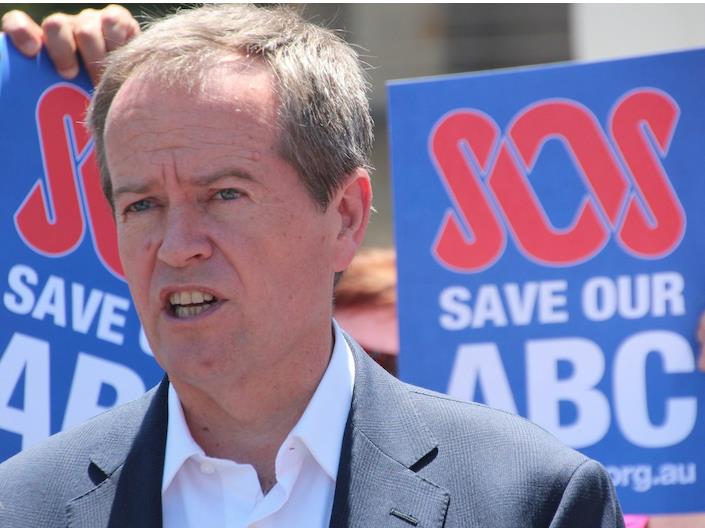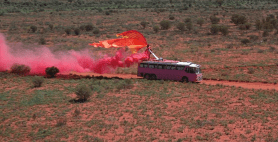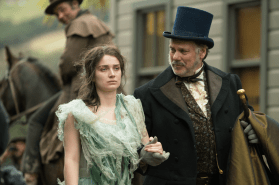Bill Shorten defending the ABC at an impromptu press conference in 2014, at the beginning of his hard slog to defeat and resignation. Image: Flickr, with thanks.
For many Screenhub readers this election has been a searing experience. We reported policies from the Greens and Labor which were informed, imaginative and dealt with the crises in our sector.
The implications for the screen sector
Targeted funding to the ABC and SBS, bolstering the children’s production sector, dealing with the holes in the taxation support, defending the quota system and regulating international streaming – these were all on the agenda.
In return the Coalition kept silent, and hid or ignored the results of their many enquiries. It would have been easy for the Liberal Party to match the Labor and the Greens, but they didn’t. This absence suggests they will unveil a different approach, which we will find destructive and for which there is no mandate.
In a way we are back to Ground Zero, except that we can anticipate cuts. The ABC is down $83m in the last budget and that will be put to the Parliament. We can expect agencies with budgets of less than $200m to be spared efficiency dividends, which include AFTRS, the NFSA, the ACMA and Screen Australia.
Now that Scott Morrison has become so presidential we can expect that his view will prevail, which will at least give us an answer on issues like quotas and tax unless he teases lobby groups for sport.
The role of the media
This situation reflects on the wider media environment. The Australian has become more and more rabid, reflecting the business plan which informs Fox News in the US and is the cornerstone of Murdoch prosperity. The Fairfax Press is now owned by Nine Network and is fumbling its way forward.
The ABC has been changing its approach, embedding hard news in much softer material, reaching out to wider audiences across Australia. The morning internet news feels much mushier, less responsive to the daily dramas. In a way that reflects the reality of the nation and the fact that we are all stakeholders and our dramas are local, regional and domestic.
The media has been soft on the Liberals. We don’t know for sure what Morrison thinks about climate change, they were allowed to have that bubble of nothing over cultural policy, they never had to talk about aspiration beyond ‘repairing a budget’ which was in deficit to save the country from another Global Financial Crisis. Housing has been ignored, problematic grants mentioned and passed over.
The broken polls
The polls failed terribly to reflect the national vote. We suspect that the focus group system may be equally broken. Facebook became a cesspit of liars and extremism while the owners banked a huge dividend from Clive Palmer’s swamp of misleading ads.
This is strange and destabilising. The gyroscope is broken and the capsule is tumbling through the sky. If audience research doesn’t work the political parties will have to find new ways of calculating their appeal which may take them to different policies.
The screen sector also relies on audience research. We are left to wonder if our approach is equally flawed, or at least contaminated by similar mistakes. What will we learn from this crisis, if anything?
We want new kinds of leaders
We have seen our culture evolve as our media has changed. In 1960, John F Kennedy was said to be the first television president while Nixon was stuck with radio. Kennedy won even though his speeches sound contrived today.
We can’t say that Scott Morrison is the first social media Prime Minister, because he is incorrigibly old-fashioned. But, on election night, Arthur Simonidis from the Libs was relaxed and compelling, Penny Wong held her fort with grim aplomb and a balanced determination to be logical, and Bill Shorten gave a terrific speech, but he sounded like an English country parson. His credibility is poisoned by his delivery.
Viewers want to trust people with a certain kind of persona. There are some overtones of class in this, but not much. The media are nastier to women who can be accused of being shrill. Margaret Thatcher took elocution lessons and sounded like a carnivorous lizard. Julia Gillard did not, and some people instinctively hated her. Albo gets away with it.
What is the difference? Successful leaders now go back to the rules taught to young actors – you have to communicate simply, you have to concentrate, and you have to relax. Added to that in a world of constant recording, you must be spontaneous.
These are the badges of a certain kind of trivial authenticity, that legitimise leaders and give them authority, and they have changed since the days of Whitlam and Fraser. They were Bob Hawke’s skills, and the electorate loved them, although they may have worn out when Keating went to war with him.
Why the change
Where did we get this change in valorisation? How did we learn to identify with a different kind of person? Here’s a punt: we got them from modern television, from successful presenters and comedians and reality TV contestants and breakfast spruikers and sponsor-able sporting heroes.
Scott Morrison was none of those things, and neither are his cabinet members. But Morrison comes from a mega-church, with an ecstatic religion and collective ecstasy. He is also a marketing man and it is entirely possible this connection has created an unusual and different kind of presidential leader.
So who gets the Labor leadership now, and what persona do they create in a time when these styles are just the artefacts of a shaken machine to fake up sincerity? We have seen some impressive people on both sides of politics in the last few years, but very few of them could bond with the voters as leaders.
However the leadership problems are resolved, it will be tough times for the industry and hard years ahead for our lobbyists. Will the screen sector find anyone in government who really cares?





